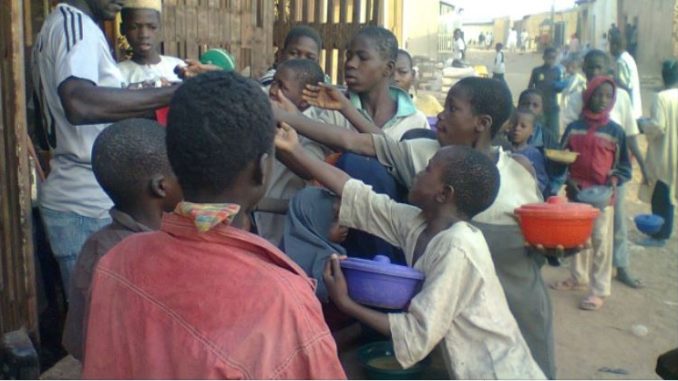
Outright despicable and unsightly, the pervasive sight of street urchins, clad in rags, and roaming the streets, begging bowls in tow, has continued to foist a derisive image on Nigeria. It is a phenomenon that is gradually becoming like a millstone round the neck of the government and the elite of the society. In a country that is fast manifesting every symptom of a failing state, the fate of these children has become the most emblematic embodiment of the crass failure and insensitivity of governance, especially in the northern parts of the country.
Yet, as odious as the system appears, the government has yet to make up its mind on what to do with the obnoxious culture that is so unfair to the children. This vacillation is not out of the lack of appreciation of the offensive nature of Almajiri system; it derives from indolence and the lack of political will to deal with it. Just recently, the National Security Adviser, Babagana Monguno, spoke passionately about the need to proscribe the practice and rescue the children from the burden imposed on them by a soulless society.
Describing them as a security risk, Monguno said, “Ultimately, government is going to proscribe this Almajiri phenomenon because we cannot continue to have street urchins, children roaming around, only for them, in a couple of years or decades, to become a problem to the society.” Evidently, the Almajiri has become a pool from where terrorist groups such as Boko Haram draw their membership. Curiously, the Presidency was quick to react by saying that there was no immediate plan to ban the system.
The Almajiri system, as it is called in local parlance, is a moral, social and political burden that can neither be reformed nor ignored by society, until the concerned authorities summon the courage and political will to confront it. It is an outdated culture, which allows children that have barely been weaned, who should still be nestling within the protective cover of their parents, to be thrown into the streets, where they fend for themselves through begging. The tragedy is doubly accentuated by the fact that it is done in the name of religious scholarship and apprenticeship.
Exploited and abused by their teachers and neglected by society that condones such a despicable culture, these children grow up without parental care or love; they feel unwanted. A child from one part of the country finds himself drifting to another far-flung end, hundreds of kilometres away from his family and loved ones. Some may even end up losing contact with their families for life. In the course of their forced peregrination, they completely lose touch with the mores of modern society, as they grow up uneducated and not useful to themselves and to society.
Many of them long to be at school like their peers, but are held back by a primitive practice that can never be justified on the grounds of religion or morality. In other Islamic cultures, while the children are well schooled in their Koranic studies, they are at the same time guaranteed access to formal education. This makes them well-rounded personae, which is why a country such as Saudi Arabia, with an illiteracy rate of 60 per cent in 1972, boasted an illiteracy rate of 5.6 per cent last year. According to Saudi Gazette, an English language newspaper based in Jeddah, the kingdom plans to achieve 100 per cent literacy rate in the next five years.
Qatar, another majority Muslim country, had a literacy rate of 97.26 per cent among those between the ages of 15 and 25 years in 2016, while Nigeria is home to over 13.2 million out-of-school children, according to the United Nations Children Fund. Among those out-of-school children, the Almajiri system accounts for almost 70 per cent of them. Which sane country would fold its arms and allow the children, which constitute its future, to lead a hopeless and rudderless lifestyle?
Interestingly, the President, Muhammadu Buhari, had in May condemned the system. In his lamentation, he had said, “When I drive round the country, what upsets me most is the status of our poor people…you see the so-called Almajiri, wearing torn dresses with plastic bowls. I think we the Nigerian elite, we are all failing.”
A damning indictment, no doubt, from the Federal Government, but what are the states who actually own the problem doing? Under the Universal Basic Education Act of 1999, every child in Nigeria is guaranteed access to nine years of compulsory and uninterrupted primary and junior secondary school education. So, the idea of parents releasing their children into the Almajiri system that deprives them of basic education is unlawful. Chapter 2, Section 18 of the Constitution reemphasises the need for government to strive to eradicate illiteracy and make provisions for free, compulsory and universal primary education, as well as free secondary and university education.
As confirmed by Buhari himself, it is the duty of states and local governments to provide access to basic education. It is wrong for the Northern States to rely on the Federal Government to rescue these abused children. It is a crime under Nigerian laws, including the Child Rights Act, for parents to deny their children the right of education.
Northern State governments should begin a programme of mass education that will take the Almajiri off the street. There is a lot that can be done with funding from UBEC, where N84 billion is currently lying idle because governors have not been able to meet the requirements for accessing the fund.
Besides, steps should be taken to stop the idea of indiscriminate procreation, which allows people to give birth to the number of children they cannot cater for. The Emir of Kano, Muhammadu Sanusi II, once deplored the practice, saying, “They end up producing 20 children, not educating them, leaving them on the streets and they end up as thugs and terrorists.” He could not have been more forthright.
END

Be the first to comment